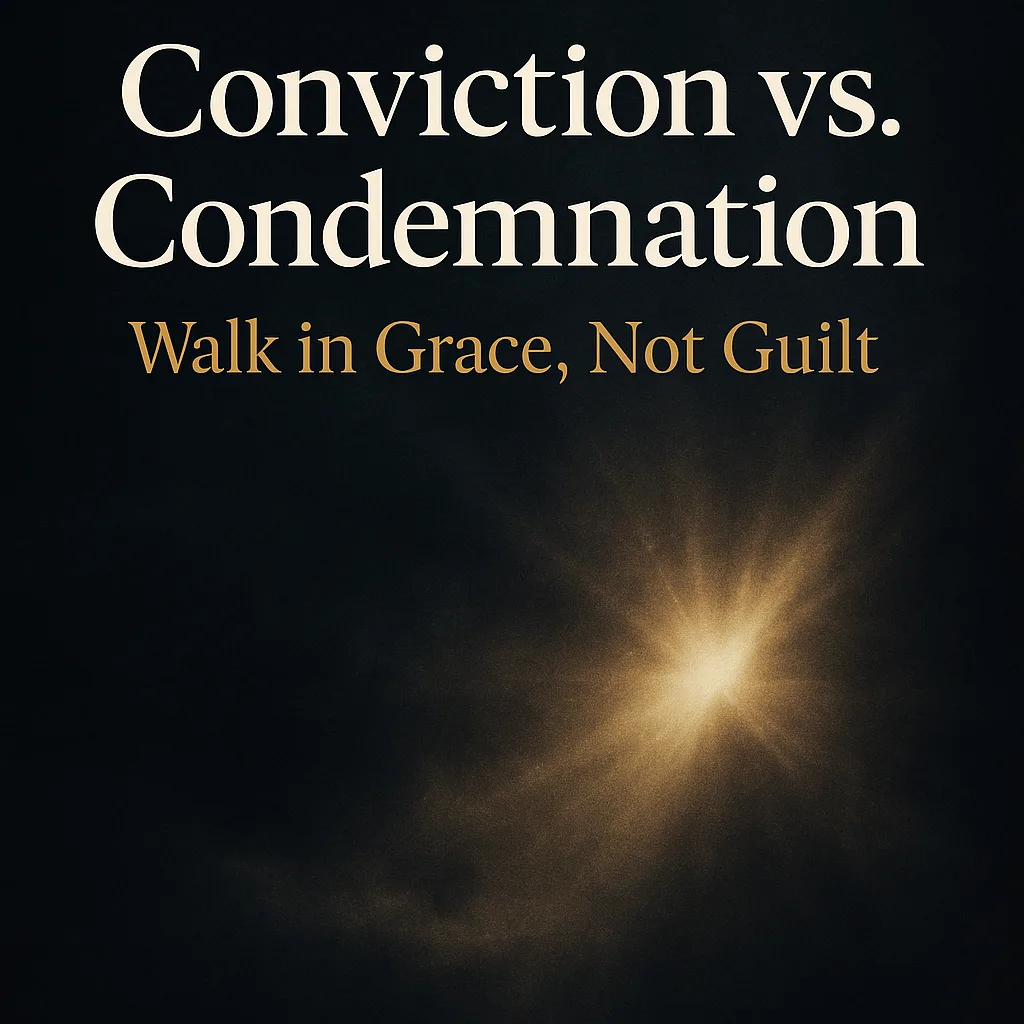⏱️ Estimated Reading Time: 5 min read
From Guilt to Grace: How to Discern Conviction from Condemnation
Discerning the Voice of the Spirit vs. the Accusations of the Enemy
Contending for the Word – August 4, 2025
Written by Dave Jenkins
What Is the Difference Between Conviction and Condemnation?
Many Christians wrestle with guilt—some of it godly and sanctifying, some of it crushing and destructive. In the Christian life, one of the most important distinctions we must learn to make is this: what is the difference between Holy Spirit conviction and satanic condemnation? At times, the difference can feel subtle. But Scripture helps us discern the voice of the Shepherd from the lies of the accuser.
At the heart of the matter is this: conviction leads to repentance and restoration, while condemnation leads to despair and spiritual paralysis.
The Nature of Conviction
Conviction is a gracious work of the Holy Spirit, exposing our sin not to shame us, but to draw us to Christ. As Jesus promised, “When He comes, He will convict the world concerning sin and righteousness and judgment” (John 16:8). The Spirit’s conviction is sharp, but not cruel — it is precise and purposeful.
When we experience true conviction, we’re not left in confusion or fear. Rather, the Spirit brings clarity, calling out specific sins such as pride, bitterness, or deceit. He doesn’t merely make us feel vaguely “bad”; He lovingly identifies what’s wrong and invites us to respond. Conviction is never about rejection. It is an invitation to return — to confess our sin, repent, and walk afresh in the forgiveness that is ours in Christ.
Genuine conviction doesn’t drive us away from God. It draws us closer. It reminds us that Christ has already borne the penalty for our sin and calls us to live in light of His grace. Conviction may humble us, but it will never crush us. It leads us to life, not away from it.
The Trap of Condemnation
Condemnation, on the other hand, is the strategy of Satan. Revelation 12:10 calls him “the accuser of our brothers…who accuses them day and night before our God.” Unlike the Spirit’s clear and loving conviction, condemnation is vague, harsh, and spiritually suffocating.
When under condemnation, believers often feel a deep sense of guilt without being able to identify why. It’s a shadowy feeling of worthlessness — a whisper that says, “You’ve gone too far. God is done with you.” It’s the voice that says change is impossible, that your failures define you, and that you’re better off hiding from God and His people.
Condemnation isolates. It burdens the conscience but offers no remedy. It focuses on our shame instead of our Savior. It robs believers of assurance and subtly denies the sufficiency of Christ’s atonement. The goal of condemnation is to keep us shackled to guilt — never truly free, never fully assured.
The Gospel’s Answer
Scripture offers a resounding answer to both the convicted sinner and the condemned believer: “There is therefore now no condemnation for those who are in Christ Jesus” (Romans 8:1). That declaration is not self-help sentiment — it is the verdict of heaven for all who trust in Christ.
If you are in Christ, your sin has been fully paid for. Your guilt has been lifted. Your standing before God is secure. You do not need to earn your way back into His favor — it was Christ’s blood that purchased your peace. So when the Spirit convicts you, repent and return to the One who loves you. But when the enemy condemns you, resist him. Stand firm in grace. Cling to the finished work of Christ.
James 4:7 reminds us, “Resist the devil, and he will flee from you.” That includes resisting the lies of condemnation that try to drown out the truth of the gospel.
Discerning the Difference
So how can we recognize what we’re experiencing? Here are a few key contrasts:
- Conviction is specific and clear. Condemnation is vague and confusing.
- Conviction invites us to draw near to God. Condemnation drives us to withdraw.
- Conviction brings sorrow that leads to repentance. Condemnation breeds despair and self-hatred.
- Conviction lifts our eyes to Christ. Condemnation keeps us focused on our shame.
Knowing the difference is essential for spiritual health. It helps us walk in freedom rather than fear, with confidence rather than confusion.
Walk in Grace, Not Guilt
The next time you feel a wave of guilt or shame, stop and ask:
- Is this drawing me nearer to Jesus — or pushing me away?
- Is a specific sin being addressed — or am I simply being buried under a vague sense of failure?
- Am I being reminded of grace — or crushed under the weight of shame?
If it’s from God, it will lead you to the cross. If it’s from Satan, it will try to convince you to stay away.
But remember: Christ has already spoken. The blood has already been shed. The verdict has already been declared.
There is no condemnation left for you — only mercy, only grace.
Check us out at Contending for the Word Q&A and at our YouTube.



